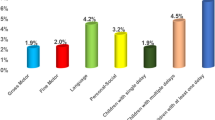Abstract
Objectives
The aim of the study was to calculate the impact that the duration of attendance and the location of the kindergarten (rural versus urban) has on the prevalence of multiple delays in preschool children.
Methods
We analyzed data from 14,068 preschool children, over a period of 14 consecutive years (1997–2010) from the Bavarian Pre-School Morbidity Survey using software package SPSS 21.0. We assessed the incidence of multiple developmental impairments (twofold or above) in various developmental domains.
Results
The highest prevalence for multiple delays in development existed for twofold impairments in the area of motor (7.9 %) and lowest in fivefold delays in cognition (0.4 %). A shorter duration of visiting a kindergarten (OR: 4.43) and an urban location (OR: 2.53) was associated with an increased risk of multiple delays in development.
Conclusions
A shorter duration and an urban location of kindergarten attendance are associated with an increased risk for children having multiple developmental impairments. From a public health perspective, the setting and duration of kindergarten attendance may be an important focus in preventive efforts to optimize health outcomes in children.

Similar content being viewed by others
References
Bavarian Law of Education and Instruction (BayEUG) of March 9, 1960; last amended on July 20, 2011, BayRS 2230-1-1-UK
Bos W, Lankes EM, Prenzel MSK, Valtin R, Walther G (2003) First results of the IGLU. School children’s performance at the end of the fourth grade in an international comparison. Summary of selected results. Hamburg (German)
Caniato RN, Alvarenga ME, Stich HL, Jansen H, Baune BT (2010) Kindergarten attendance may reduce developmental impairments in children: results from the Bavarian Pre-School Morbidity Survey. Scand J Public Health 38:580–586. doi:10.1177/1403494810376558
Cochran MM (1977) A Comparison of group day and family child-rearing patterns in Sweden. Child Dev 48(2):702–707
Darrah J, Senthilselvan A, Magill-Evans J (2009) Trajectories of serial motor scores of typically developing children: implications for clinical decision making. Infant Behav Dev 32(1):72–78. doi:10.1016/j.infbeh.2008.10.001
Elkeles T, Mielck A (1997) Development of a model for explaining health inequality. Gesundhwesen 59:137–143 (German)
Esser G (1994) The importance of organic and psychosocial risks for the development of learning disorders. Frühförderung interdisziplinär 13:49–60 (German)
Flender J (2005) Early detection of children with defined disturbances. Kinder-und Jugendarzt 36:154–159 (German)
Frankenberg WK, Dobbs JB (1967) The denver developmental screening test. J Pediatr 71:181–191
Germino-Hausken E (2006) Early Childhood Longitudinal Study. Kindergarten Class of 1998–1999. Project Summary, National Center for Education Statistics. http://nces.ed.gov/ecls/pdf/ksum.pdf. Accessed 10 July 2014
Jäger-Roman E (2000) T Performance deficits. In: Abstracts Supplement Weimar 2000 “makes school sick”: 18 (German)
Kreyenfeld M (2004) Social structure and child care. An analysis of the social and economic determinants of the use of child day care facilities. http://www.demogr.mpg.de/papers/working/wp-2004-009.pdf. Accessed 21 June 2014 (German)
Law of Public Health Services (Health Act) from 24 July 2003: Legislative and Law Paper, 452, GNr 2120 1 UG
Li X, Atkins MS (2004) Early childhood computer experience and cognitive and motor development. Pediatrics 113(6):1715–1722
Magnuson KA, Meyers MK, Ruhm CJ, Waldfogel J (2004) Inequality in preschool education and school readiness. Am Educ Res J 41(1):115–157
Mielck A (2000) Social inequality and health. Empirical results, explanations, intervention options. Huber, Bern,Göttingen Toronto Seattle (German)
NICHD Early Childcare Research Network, Duncan GJ (2003) Modeling the impacts of child care quality on children’s preschool cognitive development. Child Dev 74(5):1454–1475. doi:10.1007/BF02648159
Olechowski R, Hanisch G, Katschnig T, Khan-Svik G, Persy E (2002) Bilingualism and school—an empirical survey of Viennese primary schools (Final Report). In: Khan-Svik G (ed) Bilingualität und Schule 2. Öbv and hpt, Wien, pp 8–63
Peisern-Feinberg ES, Burchinal MR, Clifford RM, Culkin ML, Howes C, Kagan L, Yazejian N (2001) The relation of preschool child-care quality to children’s cognitive and social development trajectories through second grade. Child Dev 72(5):1534–1553
Rohling I (2002) Health and development of the Osanbrücker schoolbeginners. Multifactorial analysis of the results of school entry examinations with special consideration of the vintage 2001 (German)
Roßbach HG (2003) Pre-school education. In: Cortina KS, Baumert J, Leschinsky A, Mayer KU, Trommer L (eds) The education system in the Federal Republic of Germany. Structures and developments in overview. Rohwohlt, Hamburg, pp 252–284 (German)
Sammons P, Elliot K, Sylva K, Melhuish E, Siraj-Blatchford I, Taggart B (2004) The impact of pre-school on young children’s cognitive attainments at entry to reception. Br Educ Res J 30(5):691–712
Schöler H, Dutzi I, Roos J, Schäfer P, Grün-Nolz P, Engler-Thümmel H (2004) School entry examination 2003 in Mannheim. http://www.ph-heidelberg.de/wp/schoeler/Arbeitsbericht16.pdf. Accessed 17 June 2014 (German)
Sigmund E, Sigmundova D, Ansari W (2009) Changes in physical activity in pre-schoolers and first-grade children: longitudinal study in the Czech Republic. Child Care Health Dev 35(3):376–382. doi:10.1111/j.1365-2214.2009.00945.x
Social Code (SGB VIII)-Children and Youth Services §24 from June 26, 1990, BGBL I: 1163 (German)
Stich HL, Baune BT, Caniato RN, Krämer A (2006) Associations between preschool attendance and development impairments in pre-school children in a six-year retrospective survey. BMC Public Health 6:260. doi:10.1186//1471-2458-6-260
Stich HL, Baune BT, Caniato RN, Mikolajcyk RT, Krämer A (2012) Individual development of preschool children-prevalences an determinants of delays in Germany-a cross-sectional study in Southern Bavaria. BMC Pediatr 12:188. doi:10.1186/1471-2431-12-188
Stich HL, Krämer A, Mikolajcyk RT (2014) Clustering of developmental delays in Bavarian preschool children-a repeated cross-sectional survey over a period of 12 years. BMC Pediatr 14:18. doi:10.1186/1471-2431-14-18
Stich HL, Caniato R, Krämer A, Baune B (2016) Time trends and determinants of multiple delays in Bavarian preschool children: a retrospective analysis from 1997 to 2010. Int J Public Health. doi:10.1007/s00038-016-0839-3
Task Force “School and Youth Health in Public Health Services” (1997) The school entry examination (German)
Tervo R (2003) Identifying patterns of developmental delays can help diagnose neurodevelopmental disorders. Pediatr Perspect 13:2–6
U.S.Department of Education and National Centre for Education Statistics (2006). The Condition of Education 2006. Enrollment in Early Childhood Education Programs. U.S. Goverment Printing Office, Washington DC, p 110
Valtonen R, Ahonen T, Lyytinen P, Lyytinen H (2004) Co-occurrence of developmental delays in a screening study of 4-year-old Finnish children. Dev Med Child Neurol 46:436–443
Wohlfeil A (1991) Developmental disorders in children starting school and possibilities of their detection in the pre-inspection by the Public Health Department. Offentl Gesundh Wes 53:474–481 (German)
Zimmer R (2002) Health promotion in kindergarten. Bundesgesundheitsbl 45:964–969 (German)
Acknowledgments
Special thanks to Mr. Heinrich Trapp, Landrat of the District of Dingolfing-Landau, Franz Beblo, MD, Chief of the Department of Public Health Medicine in Dingolfing-Landau and Mrs. Ursula Niederreiter, Social Medicine Assistant, for supporting this study.
Author information
Authors and Affiliations
Corresponding author
Ethics declarations
Ethical standards
The authors declare that the study comply with the current laws of the country in which the investigation was performed.
Rights and permissions
About this article
Cite this article
Stich, H.L., Caniato, R.N., Krämer, A. et al. Influence of kindergarten on numbers of multiple developmental delays in preschoolers: an analysis over 14 years. Int J Public Health 62, 613–621 (2017). https://doi.org/10.1007/s00038-016-0883-z
Received:
Revised:
Accepted:
Published:
Issue Date:
DOI: https://doi.org/10.1007/s00038-016-0883-z




